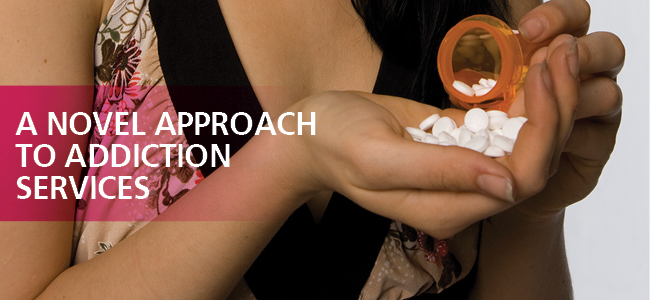Strategic Plan Area of Focus: Complex Chronic Conditions

One of the challenges in meeting the needs of patients with substance use problems is that addiction treatment has traditionally been provided outside of the hospital system. However, people who access these services often have health issues, and are at high risk of using emergency departments and being admitted to hospitals.
“There’s a very high rate of morbidity and healthcare utilization,” says Dr. Meldon Kahan, medical director of the Substance Use Service at Women’s College Hospital (WCH).
That’s one of the reasons why WCH’s Substance Use Service does things differently. Not only is it one of the few hospital-based addiction programs in Ontario, but as a joint program of the departments of internal medicine and psychiatry, it can meet a broader scope of patient needs.
The program has the potential to offer something that’s unique in our system:
a hospital-based, flexible addiction program that doesn’t put up barriers to patients, where patients can be seen quickly and offered combined medical treatment as well as counseling.
“We offer not only more comprehensive treatment, but also more accessible and flexible treatment compared to the traditional,” says Dr. Kahan. “The idea is that by being right in the hub of where patients with substance use problems are, we can see them quickly and we can offer both medical care and mental health counselling interventions.”
Compared to programs in more traditional locations, the WCH service may also be more acceptable to patients, particularly women, because of its location in a general care ambulatory facility. The Substance Use Service is housed within WCH’s Complex Care Clinic, which provides a very nonthreatening, non-stigmatizing environment for treatment and is staffed by specialists who understand the complexity of treating these conditions in a sensitive, compassionate manner.
The service sees a wide variety of addictions, referred from a wide variety of medical programs, agencies, family doctors and specialists both at WCH and beyond its walls. Some of the WCH programs that refer patients to the service include the Virtual Ward, the Complex Care Clinic, and Bridges SCOPE (Seamless Care Optimizing the Patient Experience).
The most common problems treated by the service are alcohol dependence, opiate dependence and smoking. The WCH Substance Use Service is uniquely positioned to deal with not only addiction, but also with medical and psychiatric issues that may also be present. Typical referrals include chronic pain patients whose family doctors have prescribed opiates and are now concerned that the patients may be addicted, or older patients who are being treated with benzodiazepines that may be impairing their function.
“The program has the potential to offer something that’s unique in our system: a hospital-based, flexible addiction program that doesn’t put up barriers to patients, where patients can be seen quickly and offered combined medical treatment as well as counselling,” says Dr. Kahan.
“That is something that’s simply very different than what’s currently available for patients, and we think it will make a real difference in terms of outcomes: patients will be retained in treatment, they’ll use a lot less addictive substances, and their mood and their functions will improve. And in keeping with the mission of Women’s College Hospital, it will keep them out of emergency departments and hospitals.”
The program is currently being evaluated in a Bridges trial to explore how this innovative approach to treatment can lead to better outcomes.
“This is a unique health system solution for a very major problem,” says Dr. Kahan. “Addiction is a huge reason for morbidity and healthcare utilization.”
